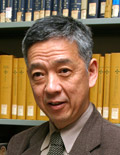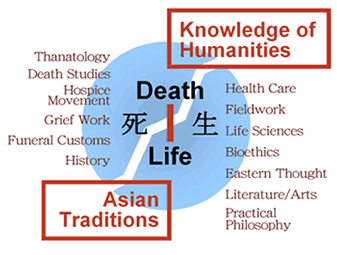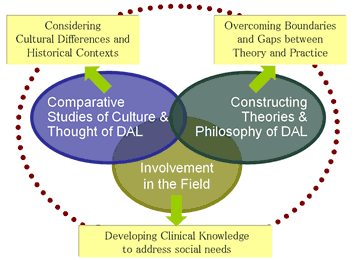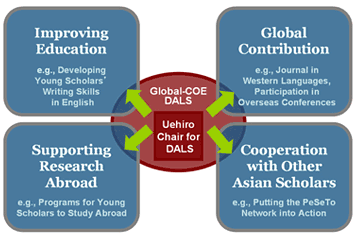 Overview Overview
Development and Organization of Death and Life Studies
Prof. SHIMAZONO, Susumu, the first program leader
 Death and Life Studies (DALS) is a new academic discipline which seeks points of contact and exchange between the Medical Field, the Social Sciences, and the Humanities. Although contemporary medical facilities expend a great deal of effort in caring for those who are dying, all cannot be solved through the Natural-Science-based modern medical paradigm. Beginning in the 1960s, the Hospice movement, for example, has made tremendous strides in North America and Europe, and education and research designed to meet the needs of those patients (and their families) who are facing death has progressed. Death and Life Studies (DALS) is a new academic discipline which seeks points of contact and exchange between the Medical Field, the Social Sciences, and the Humanities. Although contemporary medical facilities expend a great deal of effort in caring for those who are dying, all cannot be solved through the Natural-Science-based modern medical paradigm. Beginning in the 1960s, the Hospice movement, for example, has made tremendous strides in North America and Europe, and education and research designed to meet the needs of those patients (and their families) who are facing death has progressed.
This development has been simultaneous with the emergence of a vast number of problems related to Bioethics. With the possibility of organ transplant, in vitro fertilization, and genetic testing, a number of previously insurmountable problems have been overcome and the possibility of responding to human needs has greatly increased. However, although Medicine has strengthened its abilities to solve these problems, the question as to where one draws the line and delimits the role of medical intervention has become a grave problem that we now face. Accordingly, ethical decisions based on views of death and life are now being asked on a daily basis at both the clinical level and research level.
 |
| What is DALS? |
At the same time, however, what is needed from Death and Life Studies is not only relationships with Medicine and responses to problems at the clinical level. The need for Death Education in schools and universities and, according to many, the need for teaching children about the "preciousness of life" is also of importance. Fundamentally, it appears as if contemporary human society has lost the ability to face and confront death, and easy answers no longer seem forthcoming. Rapid changes in funerary rites and burial systems are just one example where the population-at-large is faced with a number of dilemmas. Debates concerning memorial and commemorative practices for the war-dead have also arisen. Although the relationship between the living and the dead is something that greatly varies from culture to culture, our age is one in which this question is being perceived on a broad level.
A Japanese work entitled Views of Death and Life was already
published in 1904 and, in a sense, is evidence that research on
Death and Life Studies was occurring in Japan before it began
in Western countries. At this early time, through the influence
of Western Culture, the need for understanding views of life and
death as found in Eastern Thought and among the Japanese themselves
was clearly recognized. Today, however, through further attempts
at comparative studies of the various views of death and life
throughout the world, progress is being made in finding solutions
to our new and current global situation.
Based on this, beginning in 2002, The University of Tokyo's Graduate School of Humanities and Sociology (Faculty of Letters)-through cooperation with the Faculty of Medicine, the Faculty of Education, and others-implemented the 21st Century COE Construction of Death and Life Studies Program. With the inauguration of the Global COE program, the Development and Organization of Death and Life Studies, we wish, partly based on our previous research efforts, to further aim for the establishment of this new academic field and also provide education and training for young researchers. We also intend to further develop a robust system of education and research in this area.
 |
|
DALS A Developing Framework
|
While basing our research on the long and great traditions of both the West and Asia, we at the University of Tokyo's Death and Life Studies Program also hope to further develop a unique global center for education and research. This also means that our program is an attempt by the Humanities, a field steeped in tradition, to respond to the needs of this new period in human history, caring for the cancer patients and their family, for example, and, through developing ties with the general population, take a more active role in society. Through the Study of Death and Life Program, then, it is hoped that we can also strive to revitalize the various disciplines of the Social Sciences and Humanities.
Based on our previous 21 Century COE project, the second part of our Death and Life Studies project aims to further develop and sytematize this discipline and, ultimately, create a permanent institutional basis for this field at the University of Tokyo. The issues we face are many. However, the main issues we face can be summarized by citing the following three areas: 1. comparative cultural research concerning Death and Life; 2. Philosophical and theoretical inquiry into the ethics of and praxis concerning death and life; and 3. the role of the Humanities at the actual level of contemporary practice concerning death and life.
Among these issues, we believe that (1) and (2) will further develop based on the accumulation of our educational experience and research at the Department of Sociology and Humanities. Our goal is to develop a new horizon through which the various traditions outside of the "West" can be understand while also taking into account theoretical and cultural observations concerning death and life that have already been delineated through the initative of Western thought and academics. We refer to this new horizion, what in the West has often been labelled "Death Studies" or "Thanatology," as "Death and Life Studies."
Issue (3) poses a number of new problems for those of us in the Department of Sociology and Humanities. This is primarily because this specific issue requires an active connection with contemporary sites of medical care (which are already dealing with a number of problems themselves). We need to address the problems faced by those who are dying, those who are facing the death of family and friends, those who seek a connection with the dead, those who are facing serious matters and decisions concerning life and death, and those who provide care for all of these people. In this sense, interaction with those in the medical field and those who educate about the various forms of care is needed. Palliative care for cancer patients is perhaps the most obvious example. Our first step is the development of a continuing education program for those who work in the medical field. In doing so, we as well, can learn a great deal about the problems faced by those in medical departments and the medical field. What the Social Sciences and Humanities has to offer is the question we must begin to ask. We believe that such a task will lead to the development and vitalization of our field.
 |
| Training Scholars for International Engagement
|
Training Scholars for International Engagement
Two of the other needs that we face as we move from the 21st
Century COE project to our current Global COE project are: 1.
Educating and training young scholars and 2. Further collaborative
research with other Asian regions.
1. Our first goal is to carefully observe what society needs
in terms of scholars. Based on this, we must allow young researchers
and graduate students to assist in the development of Death and
Life Studies. Our hope is that these young scholars, while further
contributing to the development of their own individual fields
of study, will help to create and examine the possibilities for
this new discipline (Death and Life Studies). We further seek
to encourage and support these young researchers in presenting
their research in Non-Japanese languages.
2. Interest in Death and Life Studies in China and Korea is currently
on the rise. At the same time, we intend to further deepen our
previous connections with North American and European countries.
Thus, along with these regions, and with an eye towards Muslim
and other Asian regions, we hope to contribute to the creation
of a global study of death and life. However, we must also not
be overly optimistic in thinking that we can create a perfect
blueprint for the future of such studies in just five years. The
development and fullfilment of a new discipline is a long-term
task and requires the continuing efforts of many. Simultaneously,
we will strive to create a broad overview for the future development
of this discipline. Our hope is that we can offer an attempt at
promoting new forms of global scholarly interaction and the development
of a new academic field. The creation of a small beginning for
global society is, as well, one of our hopes.
|












 Death and Life Studies (DALS) is a new academic discipline which seeks points of contact and exchange between the Medical Field, the Social Sciences, and the Humanities. Although contemporary medical facilities expend a great deal of effort in caring for those who are dying, all cannot be solved through the Natural-Science-based modern medical paradigm. Beginning in the 1960s, the Hospice movement, for example, has made tremendous strides in North America and Europe, and education and research designed to meet the needs of those patients (and their families) who are facing death has progressed.
Death and Life Studies (DALS) is a new academic discipline which seeks points of contact and exchange between the Medical Field, the Social Sciences, and the Humanities. Although contemporary medical facilities expend a great deal of effort in caring for those who are dying, all cannot be solved through the Natural-Science-based modern medical paradigm. Beginning in the 1960s, the Hospice movement, for example, has made tremendous strides in North America and Europe, and education and research designed to meet the needs of those patients (and their families) who are facing death has progressed.

